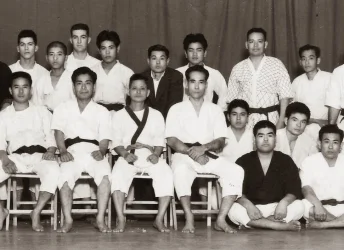This is true, including his own little brother, Eizo, who, from what I've seen, was an amazing martial artist with great physical ability. He studied with the same masters as big brother, Tatsuo, especially shorinryu's Kyan. While he adopted isshinryu, when Tatsuo passed, Eizo indeed went back to shorinryu and became a noted master in his own right.
Eizo may have followed Tatsuo in isshinryu out of filial/personal loyalty. After Tatsuo, there was no real hold on him. Tatsuo was well respected as a true master on Okinawan karate and commanded his share of loyalty. Tatsuo's son, Kichiro, inherited the family business, although Angi Uezo (who was the son-in-law) was considered by many (including me) the superior karateka. This caused a huge rift in isshinryu.
I trained with Kichiro when he visited the US and went out with him and my sensei for drinks in Hollywood. During our short time together, he did not impress me with his karate or charisma. Out of loyalty to Tatsuo, my sensei threw in with him, but he was not familiar with Angi at the time. Had he been so, I'm sure he would have associated with him instead.
I know Angi Uezo from his videos and must say he influenced the way I do kata. He had his own individual way of moving and power generation. I know someone who knows him for years and has much respect for him. Angi's top student and heir, Tsuyoshi Uechi, is also well respected in Okinawa and has a good following around the world, and has devoted himself to following the old ways (yet, he is open minded) and rebuilding the style in Okinawa. I am part of his lineage now.
So, isshinryu is full of conflicting family interests and senses of loyalty amongst its followers. Throw in some violence and love interests, it would make a good "Samurai" movie.


